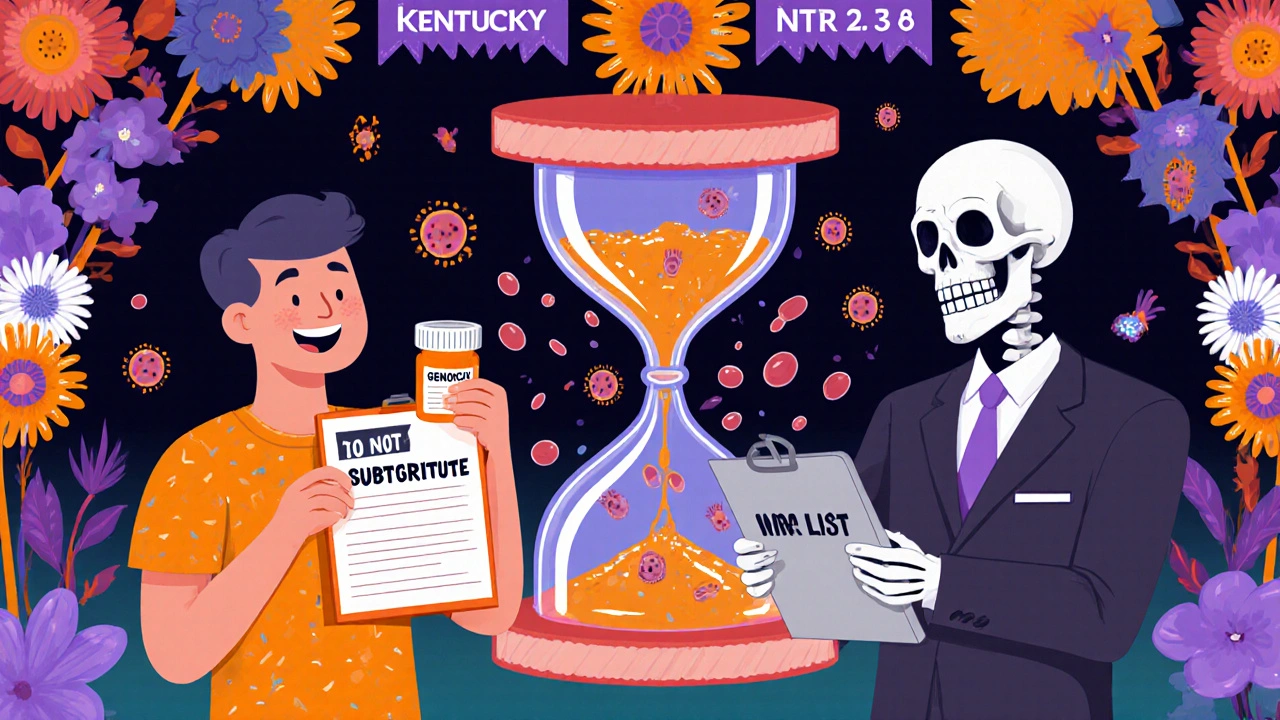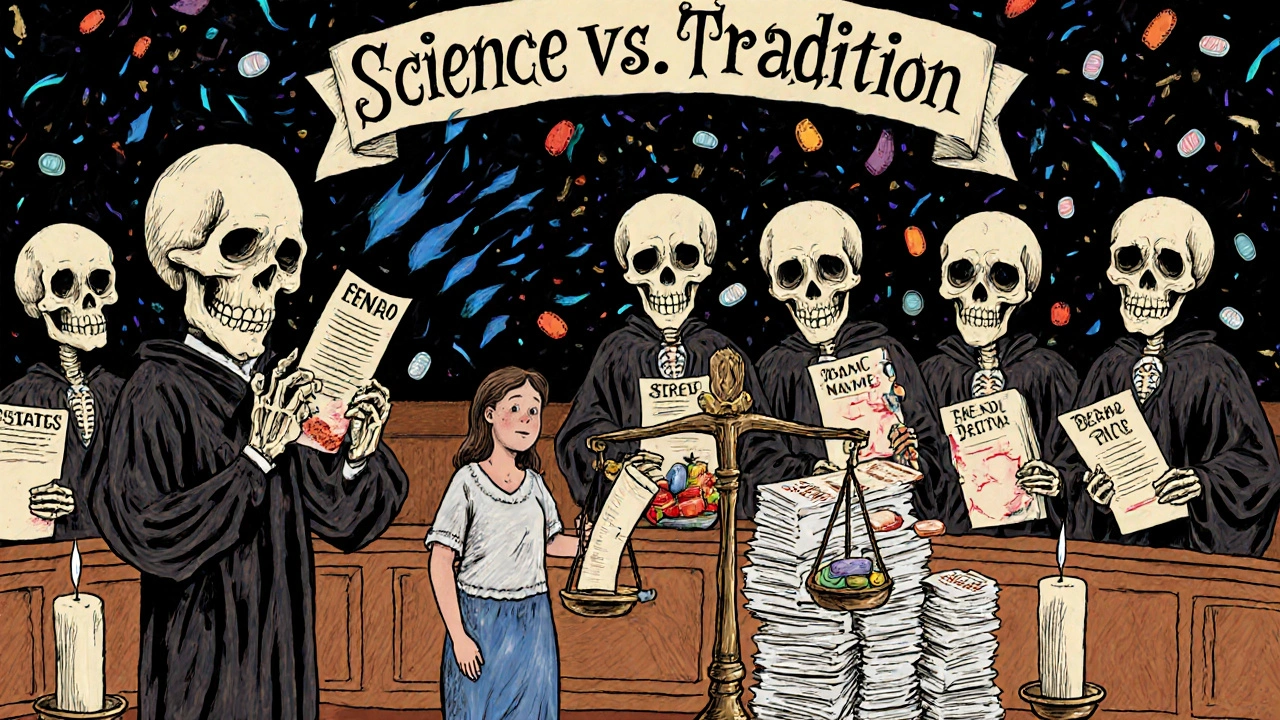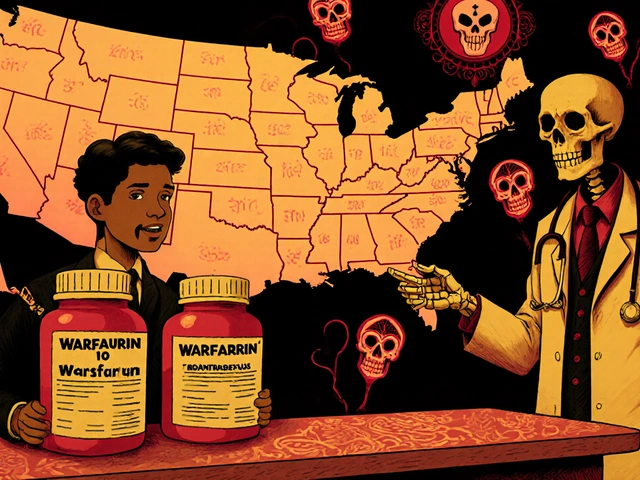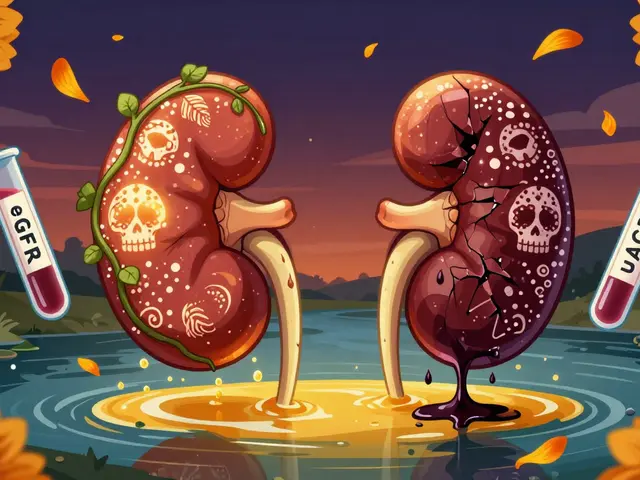NTI Substitution Laws: Which States Ban or Restrict Generic Drug Swaps

When you pick up a prescription for a drug like warfarin, levothyroxine, or digoxin, you might assume the pharmacist can swap the brand name for a cheaper generic version-just like with most other medications. But in many states, that’s not allowed. Even though the FDA says generic drugs are just as safe and effective, NTI substitution laws in 27 states create strict rules that block or limit these swaps. These rules aren’t based on federal law-they’re state-by-state decisions, often rooted in fear, not data.
What Makes a Drug an NTI Drug?
Narrow Therapeutic Index (NTI) drugs are medications where even tiny changes in dose can cause serious harm. A little too much, and you bleed. A little too little, and you clot. For drugs like warfarin (a blood thinner), lithium (for bipolar disorder), or levothyroxine (for thyroid problems), the difference between working perfectly and causing a hospital visit is razor-thin.
The FDA doesn’t officially label any drug as NTI. It doesn’t maintain a public list. But in the 1990s, it started quietly tracking a few drugs internally because pharmacists and doctors noticed problems when switching brands. That informal list became the basis for state laws-despite the FDA’s repeated stance that approved generics meet the same standards as brand names.
Here’s the catch: the FDA’s bioequivalence rules require generics to be within 80-125% of the brand’s blood concentration. For most drugs, that’s fine. For NTI drugs, that 45% range can be dangerous. A 10% difference in warfarin levels could push someone’s INR from 2.5 to 3.8-putting them at risk of bleeding. That’s why states stepped in.
How States Handle NTI Substitution Differently
States didn’t just copy each other. They built their own systems. Three main approaches emerged:
- Carve-outs: 17 states outright ban substitution for certain NTI drugs. No swap, no exception-unless the doctor writes "Do Not Substitute" on the prescription.
- Consent rules: 9 states require both the patient and the prescriber to sign off before a swap happens. This isn’t just a formality-it’s a legal requirement.
- Notification rules: 11 states allow substitution but force pharmacists to notify the doctor and patient within 72 hours. If either objects, the swap is canceled.
Some states go further. Kentucky has a formal list of 27 NTI drugs that cannot be substituted under any circumstance-unless the prescriber gives written permission. That list includes digoxin, levothyroxine, lithium, and warfarin. In North Carolina, you need two signatures: one from the doctor, one from the patient. In Connecticut, if you’re on an anti-seizure drug, the pharmacist must notify your doctor within 72 hours-and if either you or your doctor objects within 14 days, the substitution is void.
Which States Have the Strictest Rules?
Not all states treat NTI drugs the same. Here are the most restrictive:
- Kentucky: Has the most detailed list. Substitution is banned for digoxin, levothyroxine, lithium, and warfarin unless the doctor writes "Do Not Substitute" or gives explicit written approval. Pharmacists must check the list manually for every prescription.
- North Carolina: Requires written consent from both prescriber and patient for any NTI drug substitution. Forms must be kept for three years.
- Connecticut: Mandates notification for anti-epileptic drugs. If the doctor or patient objects within 14 days, the generic must be pulled.
On the other end of the spectrum, states like California, Texas, and Virginia follow federal rules. If the FDA says it’s therapeutically equivalent, the pharmacist can substitute. No extra forms. No extra steps.

Why Do These Laws Exist?
It’s not just about science. It’s about perception.
After the Hatch-Waxman Act in 1984 allowed generic drugs to enter the market, pharmacists and doctors started seeing reports of patients having seizures or bleeding after switching from brand to generic. Some of these cases were real. Others were coincidental. But fear spread.
State pharmacy boards responded by creating their own rules. The American College of Clinical Pharmacy supports these restrictions, saying NTI drugs have steep dose-response curves and deserve extra caution. The Epilepsy Foundation backs Connecticut’s rules, pointing to a 19.2% drop in seizure-related ER visits after the law passed.
But the FDA, the Generic Pharmaceutical Association, and major studies say the opposite. A 2021 study in Pharmacotherapy found only 12 of the 47 drugs on state NTI lists actually have strong evidence of a narrow therapeutic index. Warfarin, for example, has been studied in over 12,000 Medicare patients-no difference in INR stability between brand and generic.
Still, states keep the rules. Why? Because when a patient has a bad outcome, someone has to be held accountable. And if a pharmacist substituted a generic and something went wrong, the state board would want to know: "Did you follow the law?"
What It’s Like for Pharmacists
Working under these laws isn’t easy.
In Kentucky, pharmacists spend an extra 5 to 7 minutes per prescription checking the state’s official NTI list. That’s hundreds of hours a year just to make sure they’re not breaking the law. In states with consent forms, they have to print, explain, collect, and file paperwork for every NTI drug swap.
A 2022 study in the American Journal of Health-System Pharmacy found pharmacists in states with NTI restrictions spend 3.2 minutes per prescription verifying substitution rules. In states without restrictions, it’s 0.8 minutes. That’s a 300% increase in time.
Chain pharmacies use software that auto-checks state rules. Independent pharmacies? Many still use printed lists and manual checks. One pharmacist in Ohio told a national forum: "I’ve had patients get mad because I didn’t substitute their levothyroxine. I told them it’s the law. They said, ‘But the FDA says it’s the same.’ I said, ‘I know. But I’ll lose my license if I do it anyway.’"

How These Laws Affect Costs and Access
These rules cost money. A lot of it.
NTI drugs make up about $28.7 billion in annual U.S. prescriptions. In states with strict substitution bans, generic use is 12.4% lower than in states without restrictions. That means patients pay more. Insurers pay more. Medicaid pays more.
One 2021 RAND Corporation analysis found that if all states followed federal substitution rules, the U.S. could save over $1.2 billion annually just on NTI drugs. But savings aren’t the only concern. Some patients, especially those on fixed incomes, can’t afford the brand version-and are forced to switch anyway, risking health outcomes.
And then there’s the legal risk. In 2023, the Association for Accessible Medicines sued Kentucky, arguing its NTI list violates the Dormant Commerce Clause by making it harder for out-of-state generics to compete. The case is still pending.
What’s Changing?
The landscape is shifting.
In 2023, the FDA released draft guidance suggesting a new, evidence-based way to define NTI drugs: only those where the ratio of toxic dose to effective dose is 2.0 or lower. Nine states, including New York and Ohio, are now reviewing their lists to align with this standard. California passed a law in 2022 requiring its pharmacy board to base NTI designations on systematic reviews-not tradition.
The National Association of Boards of Pharmacy is working on a model state framework to bring some consistency. But don’t expect uniformity soon. States are protective of their authority to protect public health-even if the science doesn’t back it up.
What You Should Do
If you’re on an NTI drug:
- Ask your pharmacist: "Is this a generic? Is substitution allowed in my state?"
- Check your prescription label. If it says "Dispense as Written" or "Do Not Substitute," your doctor has blocked the swap.
- If you’re switched without consent and feel worse, contact your prescriber immediately. Document everything.
- Know your state’s rules. If you live in Kentucky, North Carolina, or Connecticut, you have extra protections. In Texas or California, you don’t.
If you’re a prescriber:
- Write "Do Not Substitute" on the prescription if you’re concerned.
- Don’t assume your patient knows the rules. Explain why you’re blocking the swap.
- Stay updated. Your state’s NTI list may change.
There’s no perfect system. The FDA says generics are safe. States say caution is better than regret. And patients? They’re caught in the middle.
Are generic NTI drugs really as safe as brand-name drugs?
The FDA says yes. All generics, including those for NTI drugs, must meet the same bioequivalence standards as brand names. But some states disagree. Studies show no significant difference in outcomes for drugs like warfarin or levothyroxine between brand and generic versions. However, because NTI drugs have a very small margin for error, even tiny differences in absorption or formulation can matter to some patients. That’s why some doctors and states prefer to avoid substitution.
Which NTI drugs are most commonly restricted by state laws?
The most commonly restricted NTI drugs are warfarin (blood thinner), levothyroxine (thyroid hormone), lithium (mood stabilizer), digoxin (heart medication), and phenytoin or carbamazepine (anti-seizure drugs). These appear on nearly every state’s NTI list. Some states also include cyclosporine, tacrolimus, and theophylline. Kentucky’s list includes 27 specific drugs and formulations, making it one of the most detailed in the country.
Can I request a brand-name NTI drug instead of a generic?
Yes. You can always ask your prescriber to write "Dispense as Written" or "Do Not Substitute" on your prescription. In states with consent rules, you can also refuse the generic even if the pharmacist offers it. In states without restrictions, you can still request the brand, but you may have to pay more out-of-pocket. Insurance may not cover the brand unless the generic is unavailable or contraindicated.
Do NTI substitution laws apply to mail-order pharmacies?
Yes. Mail-order pharmacies must follow the laws of the state where the patient resides-not where the pharmacy is located. So if you live in Kentucky and use a mail-order pharmacy in Florida, the Kentucky rules still apply. Pharmacies use your address to determine which state’s rules to follow. This is why you might get a generic in one state and the brand in another, even if you’re on the same medication.
Is there a national list of NTI drugs I can check?
No. The FDA does not publish an official NTI list. Some states maintain their own, like Kentucky and Pennsylvania. You can check your state’s board of pharmacy website for their official list. The National Association of Boards of Pharmacy also offers state-by-state summaries. If you’re unsure, ask your pharmacist or prescriber to confirm whether your medication is on your state’s restricted list.







Let me break this down for you folks who think the FDA knows what’s up. These NTI drugs? They’re not like ibuprofen. A 10% swing in warfarin can kill you. The FDA’s 80-125% bioequivalence range is a joke when you’re talking about blood thinners. I’ve seen patients bleed out because some pharmacist thought ‘close enough’ was good enough. States aren’t being paranoid-they’re being responsible. Stop pretending science is some holy grail when real people are dying because of lazy regulation.
Oh wow, so the FDA says generics are fine, but 27 states say ‘hold up’? Classic. It’s like saying ‘this bridge is safe’ while ignoring the cracks in the concrete. Turns out, pharmacists aren’t just cashiers-they’re frontline medics. And yeah, Kentucky’s list is insane, but at least they’re not pretending a pill is a pill is a pill. The real crime? The $1.2B savings fantasy. You can’t save money if your patient ends up in the ICU because you cut corners.
Hey everyone, I get it-this is confusing as hell. But here’s the thing: if you’re on levothyroxine or warfarin, don’t just roll the dice. Ask your pharmacist: ‘Is this generic?’ and ‘What’s my state’s rule?’ Seriously. I’ve helped friends in Texas and North Carolina navigate this, and the difference in paperwork is wild. One guy had to sign three forms just to get his thyroid med. It’s annoying, yeah-but it’s also keeping people alive. Let’s not trash the system because it’s inconvenient. We’re talking about lives here, not coupons.
Man, I just got my generic warfarin last week and didn’t even think twice. But now I’m second-guessing everything. I live in Ohio-do we have the consent thing or just notification? I’ll call my pharmacy tomorrow. Honestly, I didn’t realize how wild this stuff was. Thanks for the breakdown. Maybe I should’ve read the label harder.
This is such an important topic, and you’ve laid it out so clearly. I’ve had patients panic when their levothyroxine changed-complaining of fatigue, brain fog, even heart palpitations. Sometimes it’s psychosomatic, but sometimes? It’s real. The FDA’s data is solid, but patients aren’t data points. They’re people who feel the difference. I’m glad states are erring on the side of caution. Let’s not rush to ‘save money’ at the cost of trust in our healthcare system.
so like… the fda says its fine but states say no? lol. who even is the fda? some corporate puppet? and why do we let them decide what a pill is? maybe the real problem is that we think medicine is a science when its just… vibes. if your body feels different with a generic then it IS different. science is just a story we tell to feel safe. and now they want to force us to take ‘the same’ pill? nah. let people choose. or better yet-let the state decide. because states are real. fda? just a website.
Let’s not pretend this is about patient safety. This is about the pharmaceutical industry’s quiet war against generics. The FDA’s ‘no official list’? That’s a smokescreen. The same companies that make brand-name NTI drugs fund state pharmacy boards. Look at Kentucky’s 27-drug list-every single one is a high-margin brand. Coincidence? No. This is corporate lobbying dressed up as ‘caution.’ And don’t get me started on the 300% increase in pharmacist time-it’s a payroll scheme disguised as regulation. Wake up. This isn’t about safety. It’s about profit.
Okay, but can we talk about how wild it is that your pharmacist has to check a state list manually? That’s like asking a barista to look up whether your coffee can be made with oat milk based on your zip code. And yet-this is the reality. I used to think generics were just cheaper, but now I see they’re a legal minefield. Props to pharmacists who do this daily. And hey-if you’re on an NTI drug, don’t be shy. Ask. Even if they roll their eyes. You’re not being annoying-you’re being smart.
States should just follow federal law. This is stupid.
Science is not consensus. It is measurement. The FDA’s 80-125% range is arbitrary. If a drug has a narrow therapeutic index, the range should be tighter. But states don’t measure. They react. And so we have 27 different systems based on fear, not data. The real failure is not in substitution. It’s in the lack of a national, evidence-based standard. We are not regulating medicine. We are regulating perception.
This isn’t just about pills. This is about trust. When you hand over your life to a system-your thyroid, your heart, your brain-you need to believe the system isn’t gambling with your biology. States that ban substitution? They’re saying: ‘We see you. We know the stakes.’ And yes, it’s expensive. Yes, it’s bureaucratic. But when a patient has a seizure because a pharmacist swapped a pill without consent-who do you think gets blamed? The pharmacist? The state? Or the patient who trusted the system? We can’t cut corners on the things that keep people alive. This isn’t red tape. It’s a lifeline.